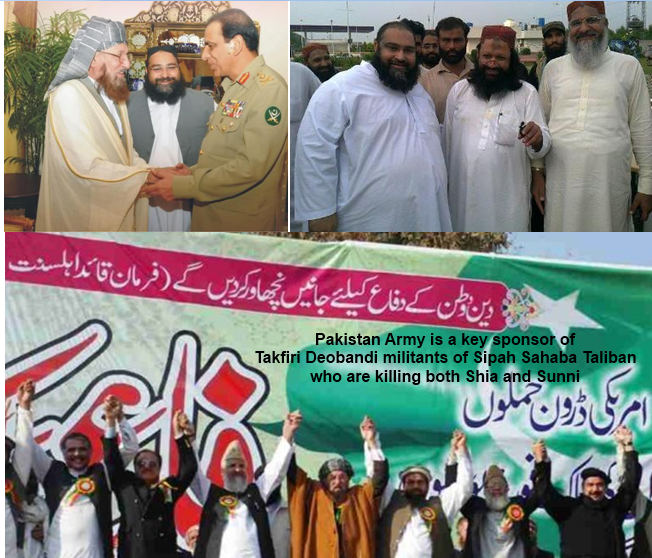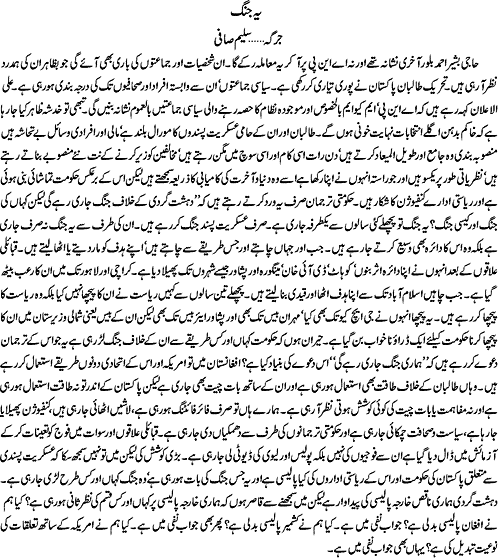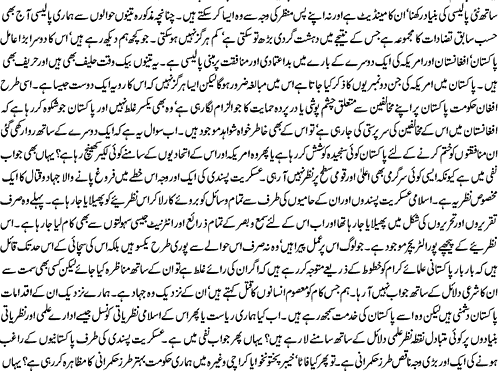General Kayani has surrendered Pakistan to Deobandi militants – by Cyril Almeida and Saleem Safi
Related posts: General Kayani’s role in #ShiaGenocide in Pakistan
General Kayani’s ostrich policy about Deobandi militants of Sipah Sahaba Taliban -by Saleem Safi
General Kayani’s dilemma: Taliban are Pakistan’s assets or liability? – by Saleem Safi
Adapted from a recent column by Cryil Almeida in daily Dawn: The Creeping Coup, with some edits and changes
[Pakistan’s Army Chief General Ashfaq Pervez Kayani is the main person responsible for the current wave of Takfiri Deobandi terrorism in Pakistan. General Kayani belongs to Deobandi sub-sect of Islam and is influenced by Maulana Sami-ul-Haq Deobandi, Maulana Tahir Ashrafi Deobandi and Mufti Taqi Usmani Deobandi. From 2004 to 2007 as ISI’s chief and since 2007 to date as Pakistan army chief, General Kayani has continued to support and protect Takfiri Deobandi militants of Sipah Sahaba Taliban to use them for cross-border Jihadist terrorism in Afghanistan and Kashmir. It was during General Kayani’s tenure that many Lashkasr-e-Jhangvi terrorists were released and allowed to freely spread hate and kill Shias. During Kayani’s tenure as ISI Chief (Oct 2004 – Oct 2007) and then as Army Chief (November 2007 to date), at least 7,000 Shia Muslims, thousands of Sunni Barelvis, hundreds of moderate Deobandis, Salafis, Ahmadis and Christians have been killed by Takfiri Deobandi terrorists of Sipah Sahaba Taliban (SST). According to Khaled Ahmed, Gen. Ashfaq Kayani, called on Sipah Sahaba’s Malik Ishaq (founder of Lashkar-e-Jhangvi) in 2009, at that time in Kot Lakhpat jail, to talk to the Deobandi terrorists who had attacked Army General Headquarters in Rawalpindi. The Army chief’s personal plane had carried Ishaq to Rawalpindi, while another plane belonging to the ISI chief, Gen. Shuja Pasha, carried Ludhianvi. It is widely known in Islamabad’s diplomatic and intelligence circles that Malik Ishaq Deobandi’s subsequent release by jail was a result of the unofficial deal between Sipah Sahaba and General Kayani. Since Ishaq Deobandi’s release, Shia genocide and attacks on Sunni Barelvis and Ahmadis have gained momentum in all parts of Pakistan, particularly in Quetta, Karachi and D.I.Khan. It is also during General Kayani’s tenure that Parachinar remained blockaded by Haqqani Taliban and Sipah Sahaba for more than four years, and Quetta has suffered unrelenting attacks on Shia Hazaras. Under his watchful eyes, ISI set up the Defence of Pakistan Council to provide legitimacy to Sipah Sahaba, and enable it to recruit more activists to enable Shai genocide.]
By most accounts, General Kayani is a lame duck [particularly when it comes to his lack of decision against Takfiri Deobandi militants of Tailban (in tribal areas) and Sipah Sahaba (in settled areas of Pakistan)].
Battered by events [Sipah Sahaba Taliban’s attacks on Pakistan army], undermined by indecision, compromised by the extension — few chiefs who haven’t run the country directly have appeared so weak before.
Beware the premature political obituary.
Quietly and deliberately, the chief has tightened his control over the mother of all institutions in Pakistan.
From the ISPR to the ISI, Gen Kayani exercises full and direct operational control in a manner few other chiefs have managed.
Every chief appoints loyalists to key positions but it’s the extent to which some offices have become invisible under Gen K that is striking.
After General Pasha, the ISI needed a lower-profile DG, but to the extent General Zaheerul Islam has been? The myth of a state within a state, of rogue sub-institutions and the like has always been just that — a myth.
The chief directed policy and the ISI — sometimes reluctantly; mostly marching in lockstep — followed orders. But there was still some air between the two before; space that Gen Kayani appears to have swallowed up.
The former DG ISI is the de facto current DG ISI.
Elsewhere, five years of controlling appointments and careers has meant a council of elders, i.e. the corps commanders, that reflects a very personal taste.
There may be widening snark and emasculatory nicknames being bandied around at lower levels, but at the top, the ranks have closed around the chief.
It helps that the cost of dissent is unacceptably high, given that with a stroke of the pen the special ones can be cast into oblivion.
But all of this power, to what end?
[General Kayani has been able to continue the policy of double dealing and double speak when it comes to protecting and nurturing Sipah Sahaba Taliban who continue to attack US, NATO, Afghan soldiers and civilians in Afghanistan and Shias, Sunni Barelvis, Ahmadis etc in Pakistan. While he has been able to maintain his stakes by Taliban proxies, including Jalaluddin Haqqani and Mullah Omar who enjoy Pakistan army’s clandestine hospitality, this has come at an enormous price to Pakistani and Afghan civilians including civil governments.]
Perhaps the most dispiriting of all developments in recent months has been the Americans, and to some extent, the British, rediscovering their love for our boys in uniform [of course there is not much option left given that Gen Kayani has successfully double dealt with the international community by harbouring and protecting the Taliban and affiliated militant groups].
That the US has seen Pakistan through the prism of Afghanistan over the past decade is well known enough. But as 2014 approaches and political deadlines exert ever-more-urgent pressure, the prism itself, never clear or coherent to begin with, is becoming murkier and murkier. There is much talk about fundamentals and bare minimums and red lines in the Afghan project but when push comes to shove, it will ultimately come down to this: The US wants a dignified exit from Afghanistan after 2014 — essentially, to wind down combat operations without the whiff of defeat — and for Afghanistan to hold together long enough to put some distance between the war and collapse, if collapse is in fact inevitable.
For that minimal project in Afghanistan, Pakistan’s help is needed. And when the Americans look at Pakistan and who can deliver what here, their eyes inevitably drift towards the boys (i.e., General Kayani and his obedient team of generals]. Call it naivety, call it desperation, or perhaps a bit of both, but all the chatter of a changing Pakistani approach to Afghanistan — a last-minute change of heart that neatly fits into American drawdown timelines — flows from the hope that Pakistan will not play the role of spoiler. As ever, sensing an opportunity to mask its own fears with the aura of indispensability — and also having absorbed the lesson of overplaying its hands after the Salala attack — the Pakistan Army has dangled the carrot of cooperation just so.
Prisoner releases (i.e., release of most dangerous Taliban, Sipah Sahaba militants from Pakistan army’s guest rooms], action against some cross-border militant activity, healthy conversations, convergences — it’s as if after a decade of being on opposite sides of a war, the US and Pakistan have suddenly woken up to the realisation that they have common interests after all.
If you don’t quite buy the theory of converging interests, there is another, more realistic explanation:
Sensing a new chapter about to begin in Afghanistan and unsure how it will play out, Gen Kayani is hedging his bets. Better to keep the lines of communication with the US open and be privy to their evolving approach than to be shut out and unable to head off harmful choices by the US or see them coming and adjust for them.
In many ways, it reflects the Gen Musharraf approach in 2001, when he embraced the war on terror and seemingly also the foreign mission in Afghanistan, only to slowly roll out the ‘double game’ once the rules of the new game and its direction had been absorbed.
Ten years on, the Americans ought to know better — but in the world of policy, trying to do something ahead of a significant shift in policy is better than not doing anything.
The generals here may well not cooperate in the end, the Americans will know, but who’s in charge of Afghan policy in Pakistan and who can deliver, if the incentives to deliver are created?
The answer, dispiritingly for those invested in the democratic project in Pakistan, is the same as ever: the boys, now guided by the chief-for-life, Gen Kayani himself.
Combine the vice-like control of the army and its intelligence apparatus with a powerful external player once again courting a ‘pragmatist’ and a general they can ‘do business with’, and we’re back in the realm of indispensability.
Indispensability is not immune to events, of course, as 2011 proved. But a mind focused on survival, and continuity, can adjust when the unexpected hits.
And few have proved better at survival and continuity than Gen Kayani.
Put it this way. 2013 brings with it the expiry of the terms of parliament, the president, the chief justice and the chief — and alone among those four, the chief seems to hold his destiny in his own hands.
[And indeed who cares for the 7,000 Shias, thousands of Sunni Barelvis, hundreds of Ahmadis and Christians killed by Jihadist assets, Deobandi militants of Sipah Sahaba Taliban. Nothing more than minor collateral damage in return for much worthier goal of becoming a king maker in Kabul.]
Appendix: Saleem Safi’s article on Pakistani State’s and General Kayani’s indecisiveness against Sipah Sahaba Taliban terrorists.
Source: http://jang.com.pk/jang/dec2012-daily/25-12-2012/col2.htm
Also, of interest is Saleem Safi’s column on General Kayani’s ostrich policy about Deobandi militants of Sipah Sahaba Taliban https://lubpak.com/archives/233867




رانا ثنااللہ کا کہنا ہے کہ حکومت کو اپنی نئی پالیسی اختیار کرنے کے لیے تین اہم عہدوں پر فائز افراد کے ریٹائر ہونے کا انتظار تھا۔ ان میں سابق صدر آصف علی زرداری، سافق چیف جسٹس افتخار محمد چوہدری اور فوج کے سابق سربراہ جنرل اشفاق پرویز کیانی شامل ہیں۔
انھوں نے کہا کہ’اگر جسٹس چوہدری افتخار اب عدالت میں ہوتے تو انھوں نے دوسری ہی دن تحفظِ پاکستان آرڈیننس کو رد کرنا تھا۔‘ انھوں نے یہ بھی دعویٰ کیا کہ 6 سال تک پاکستانی فوج کے سربراہ رہنے والے جنرل اشفاق پرویز کیانی طالبان کے خلاف کارروائی کرنے کے لیے راضی نہیں تھے تاہم عسکری ذرائع کا دعویٰ ہے کہ جنرل کیانی عدم کارروائی کی وجہ سے مایوس تھے۔
رانا ثنااللہ نے کہا کہ پنجاب کو محفوظ بنانے کے لیے پنجاب کے 174 علاقوں میں، جہاں پر پشتون آباد ہیں، کارروائی کی جائے گی۔ انھوں نے کہا کہ ’ہمیں خدشہ ہے کہ شدت پسندوں پنجاب میں جوابی کارروائیاں کریں گے۔‘
http://www.bbc.co.uk/urdu/pakistan/2014/01/140128_sanaullah_smash_taliban_rk.shtml